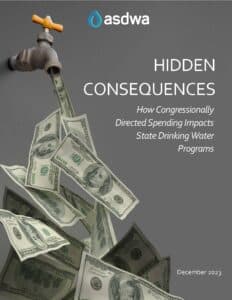ASDWA Releases New White Paper on Congressionally Directed Spending Impacts to State Drinking Water Programs
 On Wednesday, 12/13, ASDWA released a new white paper, Hidden Consequences: How Congressionally Directed Spending Impacts State Drinking Water Programs. The white paper stems from discussions with ASDWA’s members, which highlighted the need to understand how reliant primacy agencies are on Drinking Water State Revolving Fund (DWSRF) set-asides. The DWSRF is a financial assistance program to help water systems and states and is directly impacted by the use of Congressionally Directed Spending (CDS). Funding for CDS projects is taken from the DWSRF capitalization grants and bypasses state programs, being dispersed directly to the communities as grants. This practice significantly reduces the overall funding available to a state to support construction projects and set-asides. States can use set-asides to fund their drinking water programs that ensure water systems meet regulatory standards. These funds can also be used for state programs or technical assistance providers to improve drinking water system compliance and increase public health protection. The report outlines the results of an ASDWA survey that determined the number of full-time equivalent state staff funded by set-asides and programmatic activities dependent on these funds.
On Wednesday, 12/13, ASDWA released a new white paper, Hidden Consequences: How Congressionally Directed Spending Impacts State Drinking Water Programs. The white paper stems from discussions with ASDWA’s members, which highlighted the need to understand how reliant primacy agencies are on Drinking Water State Revolving Fund (DWSRF) set-asides. The DWSRF is a financial assistance program to help water systems and states and is directly impacted by the use of Congressionally Directed Spending (CDS). Funding for CDS projects is taken from the DWSRF capitalization grants and bypasses state programs, being dispersed directly to the communities as grants. This practice significantly reduces the overall funding available to a state to support construction projects and set-asides. States can use set-asides to fund their drinking water programs that ensure water systems meet regulatory standards. These funds can also be used for state programs or technical assistance providers to improve drinking water system compliance and increase public health protection. The report outlines the results of an ASDWA survey that determined the number of full-time equivalent state staff funded by set-asides and programmatic activities dependent on these funds.
The results highlight how dependent state programs have become on SRF set-asides, primarily due to the Public Water System Supervision (PWSS) grants program only seeing two small increases in the past decade. The white paper emphasizes the adverse public health consequences of a decrease in funding, noting that states may be compelled to prioritize some public health threats over others. The white paper stresses that “[w]ithout adequate state oversight, water systems may experience preventable operational or managerial failures.” Additionally, the white paper notes that fewer state resources mean less opportunity for states to work individually with water systems to help solve problems and return systems to compliance. ASDWA argues that “[w]ithout sufficient funding, water system failures may become more commonplace as state programs struggle to keep up.” Alongside the release of this white paper, ASDWA has also created a new webpage that will house additional items related to CDS in the future.

